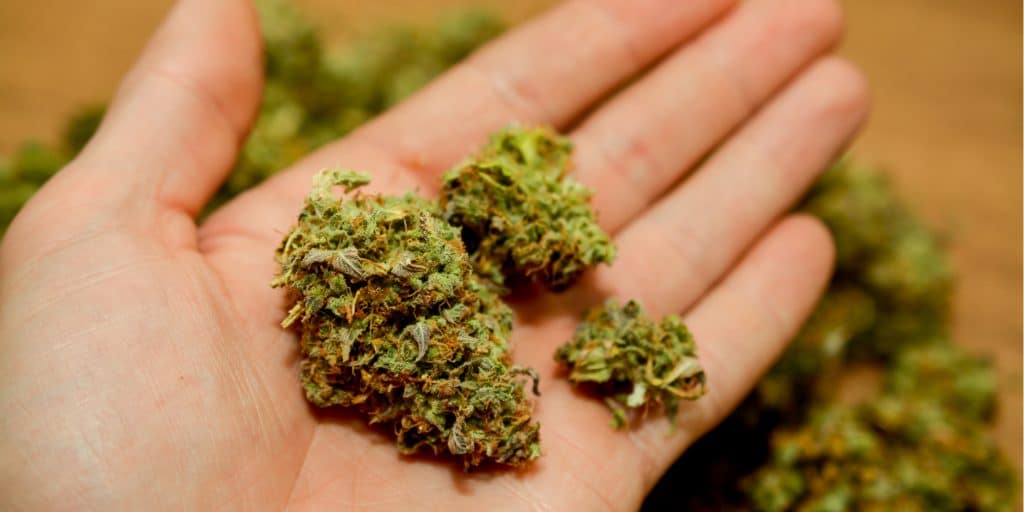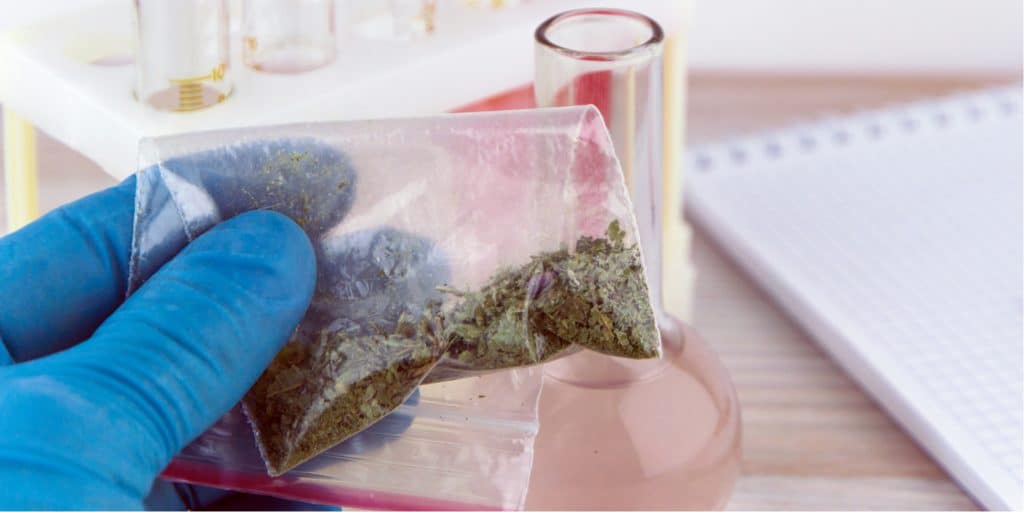
The “spice” drug refers to a variety of different chemicals that mimic the effects of tetrahydrocannabinol (THC), the active chemical in marijuana. Often called synthetic marijuana or fake weed, these chemicals are known as cannabinoids because they, like marijuana, work on cannabinoid receptors in the brain, causing mind-altering effects.
Spice drugs are synthetic cannabinoids. They don’t come from plants, but individuals create them in labs. Usually, they are sprayed onto shredded plant material and smoked. They can also be found in pods of “juice” for electronic smoking devices. Spice is sold under a variety of different names, including K2, Black Mamba, Kronic, Genie, and many other drug slang terms.
Users take spice in order to achieve a high similar to marijuana. Because of this, many people assume that “spice” drugs have the same side effects as marijuana, but this is a dangerous misconception. Because these drugs are unknown and untested, they often come with more serious side effects.
Table of Contents
What Are the Health Effects of the “Spice” Drug?


The “spice” drug is a name for a variety of different lab-produced chemicals that are not safe for human consumption. Between 2011 and 2017, U.S. poison control centers received more than 31,000 calls related to synthetic cannabinoid effects. Although both cannabis and the spice drug act on cannabinoid receptors in the brain, they often have different effects due to the slight differences in their chemical structures.
Because spice drugs cover a wide variety of different chemicals, these side effects can vary greatly from one product to another, and even between separate batches of the same product. This greatly increases the dangers of using the spice drug, as there are often unlabeled chemicals in spice that are harmful when consumed. Users often report negative physical side effects, such as excessive sweating, vomiting, or elevated heart rate. Even worse, long-term use can cause gastrointestinal problems, kidney damage, and heart failure.
Additionally, spice drug abuse can be harmful to your mental health, causing intense feelings of paranoia, depression, and aggression. Spice usage has also been connected to psychosis and hallucinations, especially in young users. Because of the lack of research, it is largely unknown how long-term usage of the spice drug affects the brain.
Is the “Spice” Drug Legal?
Every year, new synthetic cannabinoids are created and sold as spice drugs. Prior to 2010, synthetic cannabinoids were not controlled by any state or at the federal level, which popularized the perception of the spice drug as “legal weed.” Moreover, synthetic cannabinoids don’t show up on most drug tests, making the drug an attractive choice for those worried about getting caught.
However, in response to the rising number of cases of people having adverse reactions to the spice drug, many states have passed new laws banning specific synthetic cannabinoids. In 2011, Congress passed the Synthetic Drug Abuse Prevention Act, which banned multiple spice drugs by name and gave the government additional powers to stop the abuse of synthetic cannabinoids.
Additionally, the Controlled Substance Analogue Enforcement Act of 1986 allows the government to classify chemicals as scheduled substances if they’re similar to drugs that are already illegal. The Drug Enforcement Administration has used this act to ban many new variations of synthetic cannabinoids as they arise.
Although these measures have largely been successful in stopping their legal sale, spice drugs are still available for sale from many black market sources. Because of their novelty, many of these chemicals have dangerous unknown side effects. Often, they are labeled as “not for human consumption” and sold as incense or “bath salts” in an attempt to circumvent the law.
Can You Get Addicted to Spice?
Many people believe that spice is not addictive due to its similarity to marijuana, but this is incorrect; although marijuana is commonly touted as being non-addictive, the clinical definition of addiction proves otherwise. Because addiction can be psychological, many people find themselves addicted to marijuana even though it causes no physical dependence. This problem is multiplied in spice, which is still largely un-tested. In some cases, those who frequently use spice may experience withdrawal symptoms when they go too long without it.
Common symptoms of withdrawal from spice drugs include:
- Depression
- Irritability
- Hallucinations and delusions
- Nausea and vomiting
- Loss of appetite
- Extreme anxiety
- Chest pain and irregular heart rate
- Difficulty breathing
- Seizures
People who frequently use spice drugs often develop a psychological dependence on it. It can be extremely difficult to resist the urge to use spice, especially if an individual gets it from a “legitimate” source. Over time, users often develop tolerance, requiring more and more of the drug to achieve the same effects. Eventually, finding and taking the spice drug begins to occupy so much time that they ignore work, friends, and family.


For people suffering from addiction to spice, finding help may feel impossible. A German study conducted in 2009, one of the few studies done into spice addiction, found that the most difficult part of stopping spice usage was the habitual desire to re-dose that develops with prolonged usage. Although the subject successfully detoxed from spice with professional help, he began experiencing odd muscle twitches and insomnia, which led him to crave spice again. For this reason, spice drug addiction treatment does not stop at quitting.
Stopping usage is only the first step in overcoming addiction, whether the substance of abuse is the spice drug or any other. Overcoming the body’s dependence on a drug does not mean the addiction and cravings have gone away. Las Vegas rehab centers can do a lot of good to help those suffering from addiction.
At the Vance Johnson Recovery Center, we help those who find themselves struggling to take control of their lives back from their substance abuse issues. From detox to long-term recovery, we provide support every step of the way. Our highly trained addiction specialists work directly with those suffering from substance abuse issues to help them develop relapse prevention strategies and tools for managing stress in healthy, life-affirming ways.
Our extensive variety of programs lets us design a treatment schedule customized to every individual. Addiction treatment centers give people the support they need to tackle their issues head-on in a professional, caring environment, away from the stresses and temptations found in their everyday lives. If you or a loved one are considering treatment options for substance abuse, the Vance Johnson Recovery Center is here to help.
If you have any questions, you can call our admissions specialists at 888-828-2623, or you can fill out our confidential contact form. No matter how severe your spice addiction is, we are ready to help you start on the path to long-term recovery.
The post K2, Kronic, or Golden Kush: What Is the “Spice” Drug? appeared first on Vance Johnson Recovery Center.
Source
Original Author: Vance Johnson Recovery Center

